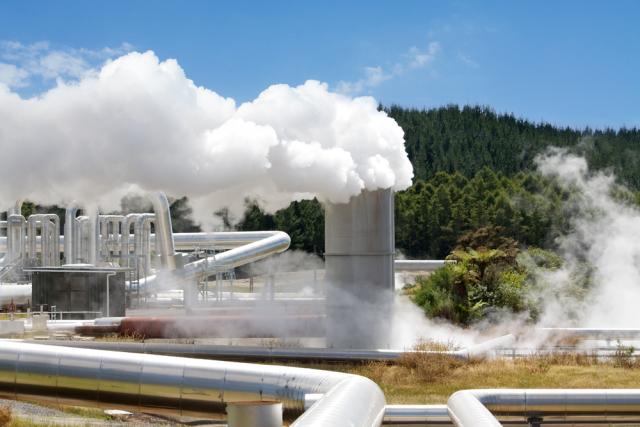
Razor Energy Corp. and FutEra Power Corp.'s co-produced geothermal power project in Swan Hills, Alberta, is now fully operational. (Source: Shutterstock)
Razor Energy Corp. and FutEra Power Corp., a wholly owned subsidiary of Razor, announced their co-produced geothermal power project in Swan Hills, Alberta, has been successfully constructed, commissioned and is operational.
Initial construction on the project began in May of 2021, with full financing acquired in March 2022. The project was privately financed by Razor and Arena Investors, as well as through funds received from the Natural Resource Canada’s Clean Growth Program Alberta Innovates and Emissions Reduction Alberta. The final estimated construction cost was $49 million, compared to an estimated budget of $37 million announced by Razor in a March 2022 press release.
The project is expected to produce 21 megawatts of electricity, according to the release.
The geothermal project combines thermodynamic processing technology called an Organic Rankine Cycle (ORC) turbine and a Natural Gas Turbine (NGT) to capture geothermal heat produced during regular oil and gas field operations and generate power with zero greenhouse gas emissions. It takes advantage of the large volume of hot production fluids that Razor produces and injects in the process of ongoing daily conventional oil and gas operations and waterflood activities. The heat produced as a byproduct is then incorporated into the ORC turbine. The electricity produced is baseloaded and unaffected by the intermittency issues that burden other renewables.
According to Razor, the co-production of the ORC turbine and the NGT at the site of Razor’s conventional oil and gas operations means no new surface land footprint is required, since the project utilizes existing assets such as processing infrastructure, producing wells, produced water reinjection system and an operating gathering and distribution system. This reduces typical geothermal project capital outlay, improving security of heat supply and improving economic returns.
FutEra’s next phase of the project includes the addition of solar and carbon capture with usage and/or sequestration, with the objective of creating a net negative carbon emitting traditional oil and gas asset.
“We can create so much advantage by using our existing oil and gas infrastructure, and expertise, to transition to a lower carbon future,” FutEra President and CEO Lisa Mueller wrote in an article for Scovan in August 2022.
Mueller is a strong advocate for geothermal energy and emerging clean technologies in Alberta. According to her, FutEra is a firm believer that the transition to a “sustainable tomorrow” requires the collective efforts of everyone, especially the oil and gas sector.
“Energy is a complex system from production to distribution,” she said. “A successful transition requires our Canadian oil and gas producers who understand the logistics of energy and have already taken steps to produce the cleanest barrel. Now, we’re leveraging that expertise, infrastructure and innovative spirit to continue curtailing emissions while meeting global energy demands. I don’t think it will be long before the oil and gas industry rebrands to the moniker of ‘energy & technology.’”
Recommended Reading
Honeywell Bags Air Products’ LNG Process, Equipment Business for $1.8B
2024-07-10 - Honeywell is growing its energy transition services offerings with the acquisition of Air Products’ LNG process technology and equipment business for $1.81 billion.
TGS Awarded Ocean Bottom Node Data Acquisition Contract in North America
2024-07-17 - The six-month contract was granted by a returning client for TGS to back up the client’s seismic data capabilities for informed decision making.
TGS Undertakes Multiclient Reprocessing Agreements Offshore Liberia
2024-06-10 - TGS and the National Oil Company of Liberia plan to reprocess over 24,700 km in the Liberia and Harper basins.
Trendsetter to Deliver Subsea Manifolds Offshore Brazil to Trident Energy
2024-06-13 - The subsea contract follows Trendsetter establishing local facilities in Brazil.
TGS Gaining Ground on Subsurface Insights in the Permian
2024-06-19 - TGS released the Dynamic Matching FWI volume for the West Kermit 3D seismic survey, which spans 1,054 sq km across the Delaware Basin in Loving and Winkler counties, Texas.





